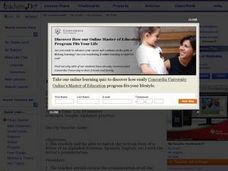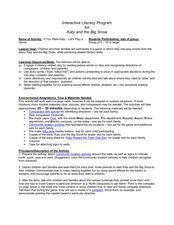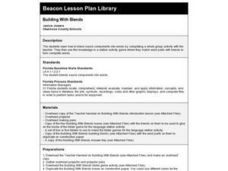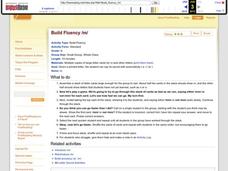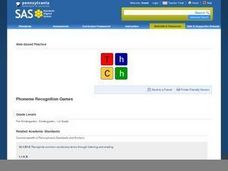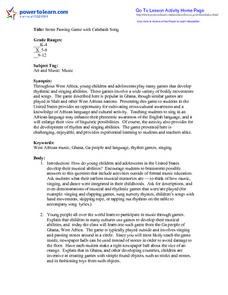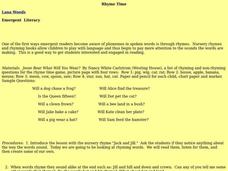Curated OER
Long Vowels
Now here is a great set of activities that will make learning about long vowel sounds a snap. The activities cover two days and include vowel identification, reading, and several great games. Kids will hunt for long vowel words, play...
Curated OER
Introduce /f/
Hook your scholars by drawing a large f on the board; do they know what letter this is? Once you've demonstrated the sound it makes, use these tips to help them make the same sound. Although the audio function is neat, it may not be...
Curated OER
Phonemic Awareness Mats
In this literacy worksheet, 1st graders use the mats in order to have a game board to construct words for the two spaces with the CVC format.
Curated OER
The Fly Swatter Game
Students are placed in small groups to participate in the "Fly Swatter Game" to reinforce phonetic sounds of letters.
Curated OER
If You Were Katy: Let's Play a Game
Students simulate sound effects from Katy and the Big Snow. They read and discuss Katy and the Big Snow, create sound effects for the objects in the book and practice sounding out beginning sounds for words. After sounding out the words,...
Curated OER
Consonant Cowboy/Letter and Sound Recognition
Students play an educational computer game, complete a letter recognition activity and close the game appropriately. They sing the alphabet song as the teacher holds each corresponding card with the letter and picture as support.
Curated OER
Under the Umbrella
Students study the letter-sound recognition of the /u/ by reciting a tongue twister, writing the letter in both upper and lower case, and identify words with the letter 'u' in them. Next, they sing a song, and listen to a story while...
Curated OER
Building With Blends
Understanding consonant blends is crucial for young readers. In this language arts lesson, learners examine consonant blends, and play the folder game, "Building With Blends," in small groups. The game is especially engaging!
Curated OER
Build Accuracy /a/, /m/
Make letter sounds a game for pre-readers using these letter cards. After you demonstrate, learners take turns drawing letters out of a bag. Weight them for the letters they have been practicing most recently. Once they've chosen a...
Curated OER
Build Fluency /m/
Once kindergartners have learned the letter m they are ready for this sound correspondence activity. Start with a stack of letter cards including mostly m and a few other letters they haven't learned yet....
Curated OER
Phoneme Recognition Games
Students explore language arts by completing an in-class phonics activity. In this word structure lesson, students utilize the Internet to identify the sounds that different letter combinations make. Students practice combining word...
Curated OER
Introduce Last Sound Segmenting (Mico Version)
What is Mico trying to say? Use a puppet to make this final-phoneme activity more engaging for kindergartners. Using three picture cards at a time (included), they listen to him say a final sound. To which of the three images is he...
Curated OER
Reintroduce /c/
Do you c what I c? Use these strategies combining pronunciation, letter recognition, and initial phoneme examples to examine the letter c with kindergartners. Scholars examine the letter shape and listen to you pronounce the soft...
Curated OER
Whirling Word Blends
Recognizing consonant sounds and word blends are the focus of this lesson. Learners recognize common consonant sounds that are word blends. They create a learning game to help them identify words that contain specific word blends.
Curated OER
Introduce /t/
What sound does the letter t make? As scholars develop letter recognition, form sound associations with strategies like these. Explain the tongue movement in making the /t/ sound, asking learners to try it. Draw the t on the...
Curated OER
Introduce /r/
Use these inventive strategies to focus on the letter r, forming sound associations along with letter recognition. Explain the tongue movement in making the /r/ sound, asking learners to try it. Draw the r on the board and give...
Curated OER
Initial Sound Accuracy, Same Sound!
Pupils study words. In this phonemic awareness instructional activity, students play a game in which they identify if two words have the same initial sound. They play the game in pairs using a stack of word cards prepared by the teacher....
Curated OER
Stone Passing Game with Calabash Song
Students discuss games and their use around the world in many different cultures and how music and games are related. They discuss the rules of West African game then play a game from West Africa and review and learn the "Calabash" song...
Curated OER
Hop on Pop - Short 'o'
Young scholars practice the alphabetic significance of the letter /o/ along with its awareness of phonemes in spoken words. They assess on construction paper the phrase, "We like to hop on top of Pop who's on top of a hot rock" written...
Curated OER
Let's Go to the Farm
Students explore corresponding letters of the alphabet with the corresponding phonemes using farm animals. They create a classroom word wall of the items they saw on a trip to the farm or zoo. Students create pictures to go along with...
Curated OER
Rhyme Time
Students explore phonemes through rhymes. They discuss nursery rhymes and rhyming words. Students read "Jack and Jill" and discuss the rhyming words in the nursery rhyme. They play a rhyming game and identify words that rhyme.
Curated OER
Sounding out accuracy, Word Baseball
Students practice sounding out words. In this phonics lesson, students play a baseball game, practicing sounding or stretching out words for accuracy. Students read the word off the card and stretch it out.
Curated OER
Rhyme Match
First graders match rhyming words. In this rhyming lesson plan students play a game with a partner matching rhyming words and a coordinating picture. The student pairs make a list of rhyming words that fit with their game.
Curated OER
Introduce word families
First graders play a matching game to find words that rhyme with each other with word endings est and ill. In this word family lesson plan, 1st graders match up the words in small groups by using word cards.





